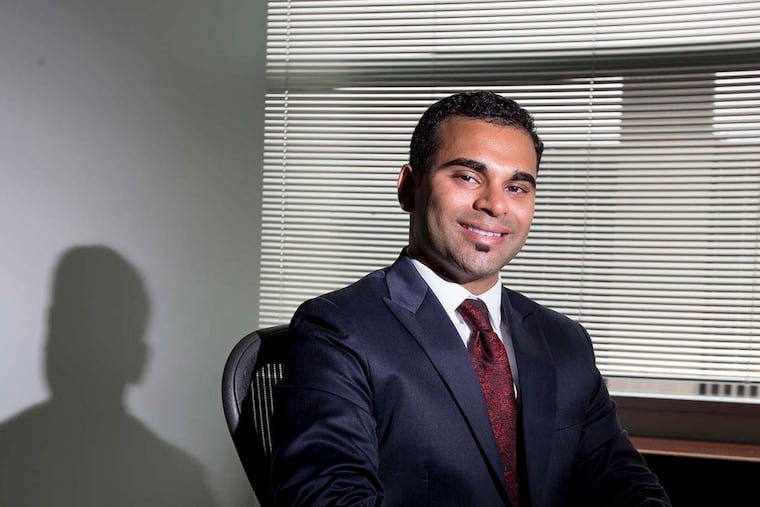At Immage, they're bringing a unique approach to battling a tough cancer
To be diagnosed with a subtype of breast cancer known as "triple negative" is to confront a terrifyingly fast-spreading, hard-to-treat disease.

To be diagnosed with a subtype of breast cancer known as "triple negative" is to confront a terrifyingly fast-spreading, hard-to-treat disease.
From the important business perspective of market size, that unfortunate group isn't especially big, 35,000 to 40,000 people a year. Yet it's one on which Immage Biotherapeutics has aimed its focus, hoping to save lives.
The year-old company, with headquarters in Bethesda, Md., is developing what president and chief operating officer Mahesh Narayanan calls the first universal immunotherapy to treat people with the disease by targeting a protein present in all breast cancers: MAGE-A.
"So far, everything is looking pretty good," Narayanan said during a recent interview at the University City Science Center, where Immage also uses space.
"We plan to open a lab in Philadelphia," said Narayanan, 27, who grew up in Upper Darby and Ridley Park and earned a master's degree in biotechnology from the University of Pennsylvania. He now calls Cherry Hill and Washington home.
Immage is among the 20 finalists in Stellar StartUps, the inaugural competition organized by Philadelphia Media Network, parent company of the Inquirer, Daily News, and Philly.com, to spotlight local entrepreneurial ventures. Winners in six categories will be announced Thursday at a cocktail reception and panel discussion at the new Pennovation Center.
After a few years consulting and one year at GlaxoSmithKline in Collegeville, Narayanan joined forces with Anton Dormer, a researcher with a medical degree and a master's in biotechnology and biomedical sciences whom he had met at a conference.
Three years ago, they formed PepVax Inc., a virtual biotech company to develop preventive treatments and therapeutics for cancer through vaccines using bioinformatics and outsourced laboratory resources.
Last year, Immage was formed to focus on more-developed initiatives - currently, a therapeutic vaccine to combat triple- negative breast cancer, a tumor that lacks the three hormone receptors that fuel most malignancies and make chemotherapy effective.
"There's really nothing specifically out there for triple negative," Narayanan said.
Citing four companies working on treatments for the disease, Narayanan said only one - TapImmune Inc., based in Jacksonville, Fla. - is focused on the same approach, but through a different protein. (The others focus on molecular therapy, he said.)
"No one is working on MAGE itself," Narayanan said. "That's what our patent is around."
In July, trials began on humanized mice - they have certain proteins that present like a human system - with results expected this month. Depending on reviews from the Food and Drug Administration, human trials could start as early as 2018, likely lasting four to five years, Narayanan said.
The ultimate goal is tumor destruction with one vaccine and a booster, costing between $50,000 and $85,000. The most common treatments are surgery and high doses of chemotherapy, he said.
By spring, Immage hopes to raise $5 million for animal studies. An additional $15 million will be needed for human clinical trials, Narayanan said.
It won't be easy, he acknowledged.
"There aren't enough biotech funds out there, especially venture capitalists," he said, noting that the competition in immunotherapy "has increased dramatically in the last five years."
With about 1,000 companies doing similar work, "it's harder to differentiate ourselves in front of the venture capitalists because the immune system only works in certain ways," Narayanan said.
Given the long process to get to market, biotech funding requires investors with patience.
"A few more daring investors might be very helpful for Philadelphia," said Narayanan, citing Boston as more fertile ground for biotech funding.
In Philadelphia, which has a rich "eds and meds" sector, funding sources "are tremendous" for med-tech and digital-health start-ups because "investors see a much faster return," said Christopher Molineaux, president and CEO of Pennsylvania BIO, a trade association for the life-sciences industry. "It's much more difficult when you're looking at therapeutics or medical devices, diagnostics, because the lead time is so much longer."
Successful outcomes also can be tough to come by.
"On average, a prescription drug when it enters Phase 1, the odds of that drug making it to approval are 1,500 to 1," Molineaux said.
At Immage, optimism prevails, fueling plans for lab space and researcher hires in Philadelphia, along with partnerships with hospitals for clinical trials.
Depending on those trials, the company that now has seven employees could have 20 to 30 within three to four years, Narayanan said.
215-854-2466
@dmastrull